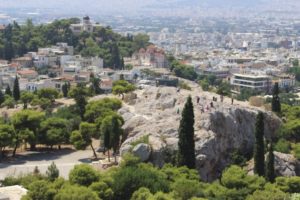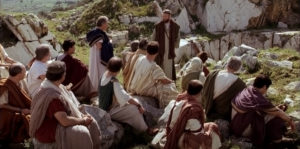
This week in Come Follow Me we get to read Acts 17. This chapter starts out with Paul and Silas making their way through Macedonia and Thrace, spreading the gospel and teaching the Saints. After Paul escapes the angry mob in Thessaloniki, he ends up in Athens, a city, “wholly given over to idolatry”. He goes to the Aeropagus, or Mars Hill, which is a place where people congregate to gossip and debate. While there he preaches the gospel.
Here are some of the highlights from my notes:
- Athens was the cultural center of the Greeks and world culture — it had some good ideas, but overall was not a good place.
- The Athenian philosophers viewed God as an abstract power, not a living being and as our Father. This is evident today in the concepts of the “Prosperity Gospel” that is so popular — this is the God of marigolds, as Elder Holland taught.
- They worshiped the creations of their own hands, rather than God. What things are distracting me from my religious focus and the Lord?
- They replaced revelation with reason, debate and their own ideas. There are so many people, groups, and movements in and out of the Church that are doing this right now. How do I protect myself from these things? How do I teach my children how to discern truth from error, right from wrong?
- They valued these things (their own ideas) over the truths of God.
- As they were wholly given over to idolatry, they were very superstitious. This superstition was their religion. They worshiped everything, so as to offend nothing. This is political correctness gone horribly awry — and is not much different than today. It is really important to learn how to not be offended.
- Aeropagus = Mars Hill. Rocky hill in the center of Athens. Directly to the south was the Acropolis which housed the temple of Athena, the patron saint of Athens, and Greek goddess of wisdom, courage, justice, law and war. She was venerated as the protector of the city of Athens. South of this was the temple of Dionysus, the Greek god of wine, merriment and theater.
- Paul is preaching in the heart of Athenian culture, with the most idolatrous and “Athenian” of the Athenians.
 In verse 19-20 The Epicureans and Stoics ask Paul, “May we know what this new doctrine, whereof thou speakest, is? For thou bringest certain strange things to our ears: we would know therefore what these things mean.” Paul teaches them. Here are the things I was most impressed by from Paul’s sermon:
In verse 19-20 The Epicureans and Stoics ask Paul, “May we know what this new doctrine, whereof thou speakest, is? For thou bringest certain strange things to our ears: we would know therefore what these things mean.” Paul teaches them. Here are the things I was most impressed by from Paul’s sermon:
- These people are too superstitious — vs. 22
- They ignorantly worship the unknown God. Paul declares to them that the One True God is the unknown and only God. vs. 23
- The Lord created the world and everything in it. He does not dwell in these temples made by men’s hands, which are devoted to the idols of men’s hands. vs. 24-25.
- God made man, is aware of us, and is not respecter of persons. He appointed our lives. vs. 26
- Seek the Lord, he is not far from us. vs. 27
- Because we are the Children of God, in Him we live. vs. 28-29
- We are commanded to repent. vs 30.
- God the Father will judge us in righteousness because of Jesus Christ. vs. 31.
What was the reaction of the Athenians? Some mocked, and some believed. Paul experienced a similar condition on Mars Hill that we do today when we try to share the gospel. We are in a world that is so religiously checked out, and/or focused on the wrong things. I have really come to appreciate that the ancient saints faced many of the same trials as the modern saints, and I am trying to glean as much from them as I can. The worldly winds of change blow hard, hot, and quick. People of faith are pressured to accept the world and mocked or persecuted if we don’t fall in line. Who has been called a racist, a bigot, unloving, unkind for accepting the Lord’s standards? We will be swallowed up by the world if we are not careful So when we encounter people and endeavor to teach them, share with them, or defend our beliefs, we must teach them who God is first. Remembering we are children of God solves most of the problems we face. Forgetting this also leads us down bad paths. We also must be bold and unafraid like Paul as well, and unafraid to stand up, and speak out for what we know is right and true.


In Greek, the term translated “superstitious” merely means religious. It appears the Stewart translators wished to emphasis the difference between religiousness in support of the true God (the trinitarian godhood) and religiousness in support of false gods. We see this migration of word meanings elsewhere.
That’s why it’s nice to have studied Greek (a skill the husband has in our household) or to consider Greek translations (biblehub is handy for those of us who don’t speak biblical Greek).
That said, as we were reading this chapter last night, the fan girl in me was like, “Mars hill!!!”
As Meg said, the phrase “too superstitious” is better translated something more like “extremely religious.” It was meant to be a compliment, a way to start off the speech by getting on the audience’s good side; it’s a very rhetorically well made speech, showing Paul (or at least Luke in his recreation of Paul’s speech) had some basic rhetorical training.
Another interesting point is that when the Greeks say “he preached unto them Jesus and the Ressurection” – a better translation would be “he preached unto them Jesus and Anastasis” since the idea in this case is the Greeks are so clueless they think “Anastasis” (resurrection) is the name of a female deity that Paul preaches (sort of like saying “He preaches Zeus and Hera”). How often do we run into people so clueless about our faith, they get basic ideas wrong?
I like NT Wright’s translation of the speech:
“Men of Athens,” he said, “I see that you are in every way an extremely religious people. For as I was going along and looking at your objects of worship, I saw an altar with the inscription to an unknown god. Well: I’m here to tell you about what it is that you are worshiping in ignorance. The God who made the world and everything in it, the one who is Lord of heaven and earth, doesn’t live in temples made by human hands. Nor does he need to be looked after by human hands, as though he lacked something, since he himself gives life and breath and all things to everyone. He made from one stock every race of humans to live on the whole face of the earth, allotting them their properly ordained times and the boundaries for their dwellings. The aim was that they would search for God, and perhaps reach out for him and find him. Indeed, he is actually not far from each one of us, for in him we live and move and exist; as also some of your own poets have put it, ‘For we are his offspring.’ “Well, then, if we really are God’s offspring, we ought not to suppose that the divinity is like gold or silver or stone, formed by human skill and ingenuity. That was just ignorance; but the time for it has passed, and God has drawn a veil over it. Now, instead, he commands all people everywhere to repent, because he has established a day on which he intends to call the world to account with full and proper justice by a man whom he has appointed. God has given all people his pledge of this by raising this man from the dead.’
Wright, N. T.. The Kingdom New Testament: A Contemporary Translation . HarperCollins. Kindle Edition.
Great insights, Joyce! Thanks for sharing. I like your point about political correctness.